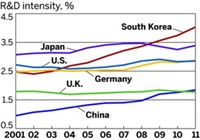Advertisement
Grab your lab coat. Let's get started
Welcome!
Welcome!
Create an account below to get 6 C&EN articles per month, receive newsletters and more - all free.
It seems this is your first time logging in online. Please enter the following information to continue.
As an ACS member you automatically get access to this site. All we need is few more details to create your reading experience.
Not you? Sign in with a different account.
Not you? Sign in with a different account.
ERROR 1
ERROR 1
ERROR 2
ERROR 2
ERROR 2
ERROR 2
ERROR 2
Password and Confirm password must match.
If you have an ACS member number, please enter it here so we can link this account to your membership. (optional)
ERROR 2
ACS values your privacy. By submitting your information, you are gaining access to C&EN and subscribing to our weekly newsletter. We use the information you provide to make your reading experience better, and we will never sell your data to third party members.
Policy
U.S. Competitiveness In Research And Development Continues To Erode
Report: R&D in emerging economies is growing rapidly, says National Science Board’s “Science & Engineering Indicators” study
by Susan R. Morrissey
February 7, 2014
The U.S., Europe, and Japan no longer monopolize the R&D arena because emerging Asian economies are expanding their share of global R&D. This is a major finding of a just-released report from the National Science Board, the policy-making body for NSF and an advisory panel to Congress.
“Emerging economies understand the role science and innovation play in the global marketplace and in economic competitiveness and have increasingly placed a priority on building their capacity in science and technology,” says Dan Arvizu, the chairman of the National Science Board. This focus on R&D is rapidly changing the scientific landscape, adds Arvizu, who is director and chief executive of the National Renewable Energy Laboratory.
For R&D performed worldwide in 2011, the U.S. remained the global leader, holding almost a one-third share. China came in second, performing 15% of global R&D.
While the science and technology lead held by the U.S. is decreasing, the report finds that the U.S. still leads in many areas. These include total R&D investment, number of high-quality publications, patents issued, and income generated by intellectual property export. The report also finds that U.S. R&D has rebounded from the Great Recession, thanks in part to funding from the 2009 American Recovery & Reinvention Act.
The “Science & Engineering Indicators” report has been compiled every two years since 1972. It is the most comprehensive federal information and analysis on the nation’s position in the science and technology arena.



Join the conversation
Contact the reporter
Submit a Letter to the Editor for publication
Engage with us on Twitter